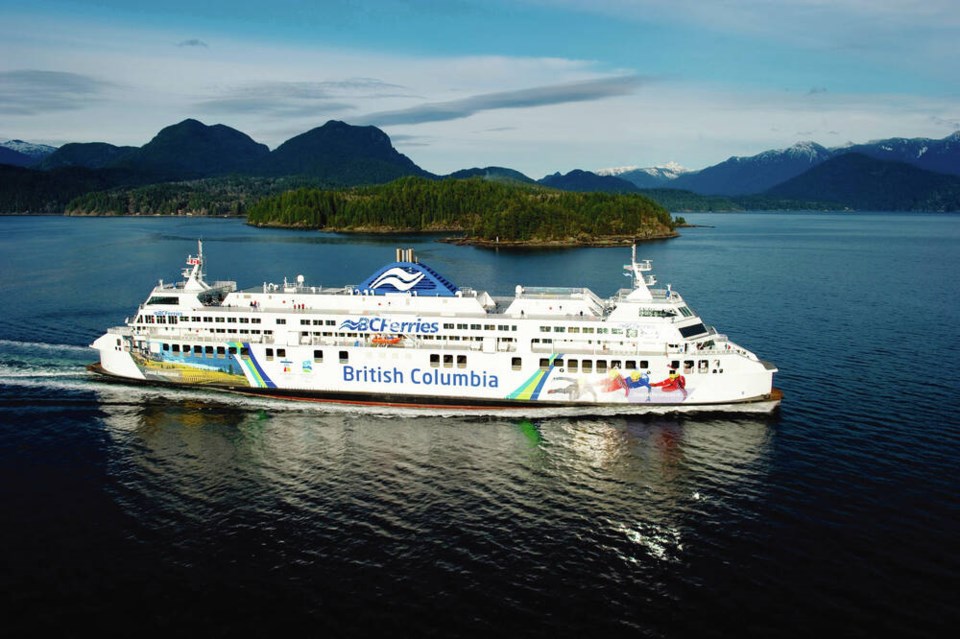B.C. Ferries says it’s planning to order four new electric-powered Island-class vessels under an accelerated schedule.
But it’s also facing financial uncertainties while it awaits a decision on passenger-fare increases during the next four years.
The decision on fares is expected Sept. 30. New rates would go into effect April 1, 2024.
It’s anticipated that the annual average maximum level for ferry-fare increases will be about three per cent, thanks to a $500-million injection announced by the province in February.
The public is invited to have its say on ferry fares by Sept. 10 by contacting the B.C. Ferry Commission, which sets the price cap for fares and decides on capital spending approvals.
The price cap is set at a level to allow B.C. Ferries to cover costs such as fuel and labour, capital costs such as new vessels and terminals, and service its debt.
B.C. Ferries is painting a cautious picture around its expectations.
“Various conditions continue to be fluid, leading to both a level of uncertainty in determining the accuracy of various major costs relevant to the company’s longer term outlook, and considerable potential for negative financial performance.”
It said that there is considerable uncertainty in areas such as traffic and staffing which would result in “negative financial performance and limit the company’s ability to adequately address current challenges.”
In late February, Premier David Eby announced the $500 million for B.C. Ferries, saying the government’s goal is to keep annual average fare increases to below three per cent per year.
“We know the cost of everything continues to go up due to global inflation, but by acting now, we can prevent double-digit fare increases from hitting people who depend on our ferries,” he said. At that time, there was speculation that increases would top 10 per cent.
Ferry commissioners announced on March 31 in a preliminary price cap report that fares could increase by 9.2 per cent annually for four years. Nicolas Jimenez, B.C. Ferries president, immediately assured the public that would not happen and that he expected increases to be at three per cent.
Meanwhile, the B.C. Ferries vessel Coastal Renaissance has been out of service since late August due to a failed motor, and Coastal Celebration was out of service a few weeks earlier. Together, problems with the two ferries affected thousands of customer bookings.
The continued shortage of certified mariners has led to sailing cancellations for months and B.C. Ferries is taking steps to help resolve the situation. But the cancellations still happen. On Tuesday, all 18 sailings on the Klista, between Brentwood Bay and Mill Bay, were cancelled because of a crew shortage.
In its report, B.C. Ferries said that the global shortage of certified marine personnel is expected to “continue to create very competitive labour market conditions, influencing employee options and salary expectations.”
The company and the union representing its workers have been in wage talks since early August.
The company has hired 1,200 employees in the past year, a net gain of 500 people, Deborah Marshall, B.C. Ferries spokesperson, said Tuesday.
Plans to order four new Island-class ferries have gone to the B.C. Ferries board. Projected cost of the new ferries is the same but the program has been accelerated, the report to the commissioners said. No cost estimate was provided for the new ferries.
The $500 million for B.C. Ferries was part of a $2-billion surplus the province allocated to ministries and government-related bodies this year.
The B.C. Liberal Party (now the B.C. United Party) voted against the dispersal of funds, which included the money for B.C. Ferries. It was allocated without a comprehensive plan, said Peter Milobar, B.C. United finance critic.
He questions what will happen to fare increases when the province’s contribution runs out.
“We don’t take issue with the overall concept of trying to keep rates as low as possible, Milobar said.
Common sense indicates if fare rates are kept artificially low and then an annual inflation rate compounded over a few years is added in, then total fare hikes in the future could be far higher, he said.
There was no clear data or information to indicate clearly to taxpayers what the $500 million would actually accomplish and how it was calculated, he said.
On the Labour Day long weekend, B.C. Ferries completed 1,500 sailings. The vast majority were on time, Marshall said.
Cancelled sailings occurred on the Earls Cove-Saltery Bay route when an employee scheduled to work was involved in a motor vehicle accident. The relief person was not available, resulting in not enough crew to sail.
Between Thursday and Monday, the system carried 77,014 vehicles and 240,704 passengers. That’s 3.5 per cent fewer vehicles than the 2022 long weekend and 1.1 per cent more passengers. With some sailings running out of space for cars, B.C. Ferries has been urging people to board as foot passengers.
>>> To comment on this article, write a letter to the editor: [email protected]



